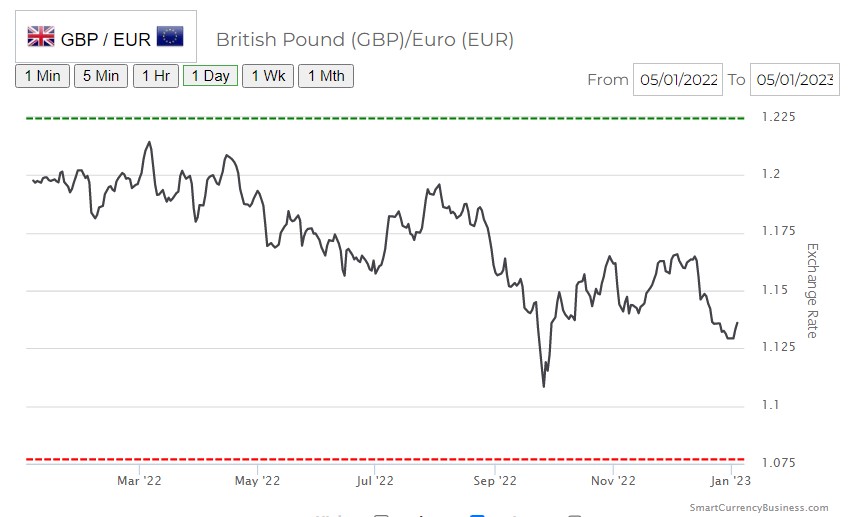How much will your pounds (or dollars) be worth if you’re buying a property in Europe in 2023? See the major influences of last year and how they will continue to affect how much you have to spend in Europe next year.
What happened in 2022?
During 2022 one pound sterling was worth as little as €1.11 and as much as €1.21, with an average of €1.16. That meant a €200,000 property in the eurozone, at the interbank rate, cost as much as £180,000 and as little as £165,000.
Sterling’s main influences came from, firstly, inflation, and the interest rate rises to combat it. Secondly, arguably, the gradual realisation of the economic cost of Brexit, with a US trade deal far off and the UK with the only G7 economy still smaller than pre-Covid. Thirdly, the calamity of September’s abortive mini-Budget, especially on mortgagees.
For buyers in Europe from the US, the range for a €200,000 property was from $192,000 to $230,000.
It was a year of volatility, but certainly not unprecedentedly so. We saw the end of Covid lockdowns globally but war and climate emergencies rising. The euro was hit by the war in Ukraine on its eastern border, with worries over escalation early in 2022, then worries over power supplies at the end of the year.
The US dollar benefited from a ‘risk-off’ attitude, whereby investors put their money in the dollar as a safe haven.
Late in the year, as China opted to end its zero Covid policy and open up, we saw a surge in the commodity-backed Australian and Canadian dollars.
Where are currencies compared to January 2022?
The result compared to this time last year is:
- The pound around 5% down on the euro, 6% down on the Australian and Canadian dollars and 11% down on the US dollar.
- The euro 6% down on the US dollar and Swiss franc, level with the Australian and Canadian dollars and 6% up sterling.
- The US dollar up on everything, including 12% up on the pound, and around 6% up on the euro and Canadian/Australian dollars.

What will be the early themes of 2023?
The start of 2023 continues with recession, the battle against inflation, stalemate in Ukraine and industrial strikes in the UK and abroad.
Some of these issues are related. Inflation in the UK hit over 11% in 2022 but already appears to be coming down as the Bank of England’s interest rate rises bite. It can now possibly afford to be less hawkish on inflation, and already two members of the Bank’s Monetary Policy Committee voted for no interest rate rise last month. Current forecasts are for a rapid decline in inflation, returning to the target of 2% in early 2024.
Traditionally the currency markets favour a currency where there is inflation as it means interest rate rises will follow – and a better return on investors’ sterling deposits. However, interest rates have shot up so fast that the downside risk of recession may be counteracting that effect. It is likely that the Bank of England will rein and eventually end its interest rate rises, which is likely to affect sterling.
Traditionally the pound also goes in line with stock markets (not all currencies do), so watch out for a positive business environment.
Politically, the currency markets reacted positively to the arrival of Rishi Sunak and Jeremy Hunt in Downing Street. However, to impress the markets in 2023 the government will need to deliver on growth and avoid trade-endangering confrontations with the EU.
Some key interest rate decisions and data releases to watch out for include:
Bank of England interest rate decisions: 2nd February, 23rd March
European Central Bank interest rate decisions: 10th February, 16th March
US Federal Reserve interest rate decisions: 1st February, 22nd March
UK GDP: 13th January, 10th February, 10th March
UK Inflation: 18th January, 15th February, 22nd March
UK Unemployment: 17th January, 14th February, 14th March
GfK Consumer Confidence: 20th January, 24th February, 24th March.
Protecting your budget
While such external events will directly affect the price of a property that international buyers pay for a property in Europe in 2023 (or indeed, those with smaller transactions or transferring money across borders) it doesn’t have to be this way.
With a forward contract you can fix your exchange rate for up to a year. For example, suppose you plan to buy a property in the eurozone and have a budget of, say, €200,000 at today’s exchange rate. You can pay a deposit to Smart Currency to fix that rate. That way, if you commit to buying a home and the value of the pound drops against the euro, you wont be affected.
Register for an account with Smart Currency and your specially designated personal trader will explain all.





















